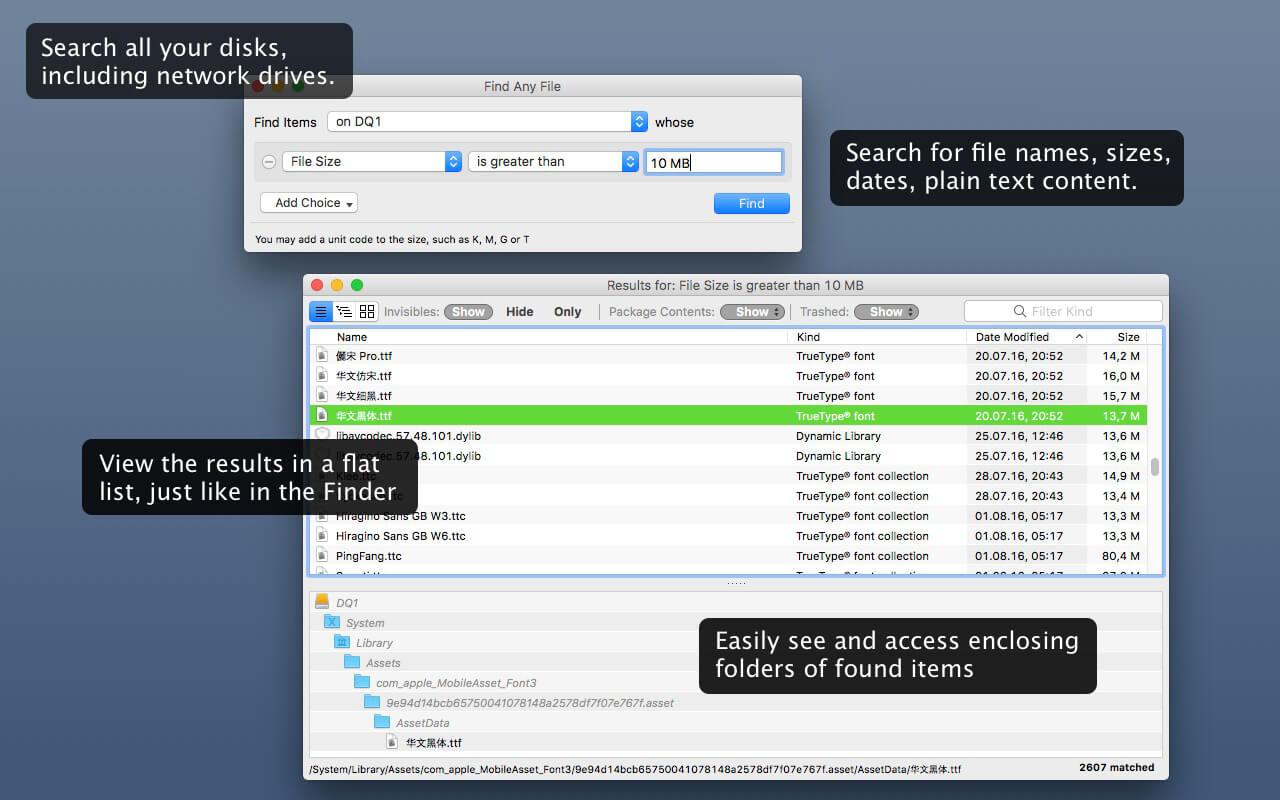
This lets you search for file properties such as name, creation and modification dates, file size, even plain text inside files.Īnother useful feature is its hierarchical results view (see screenshots).

those inside bundles and packages, and inside system folders that are usually excluded from Spotlight search.Ĭontrary to Spotlight, it does not use a database but instead searches the data on disk directly. You can even search on disks that are not indexed by Spotlight, including network server (NAS) volumes.įind Any File can find files that Spotlight doesn't, e.g.
#Find any file software#
#Find any file pdf#
By file name, date, size, and even plain text content (but not text in Word and PDF files, see note below). Unhappy with Spotlight because it does not find files that you know to be there? Use FAF to find every file on your disks, including those usually hidden. students Meng Xu, Sanidhya Kashyap, Jungyeon Yoon, and Wen Xu, and SCS Associate Professor Taesoo Kim. He co-wrote the paper, Finding Semantic Bugs in File Systems with an Extensible Fuzzing Framework with SCS Ph. Kim presented the work at ACM Symposium on Operating Systems Principles (SOSP) in Huntsville, Ontario, Canada from Oct. “With these jobs offloaded, a developer now can only focus on writing a reliable bug checker (if it does not already exist) for the bug type he or she is interested in finding,” Kim said. ♻ug reproducer with a test case minimizer that automatically verifies the reported test cases and reduces the size of the test case, respectively Feedback engines that summarize the effects of test cases and determine if they are effective enough to further mutate.libOS-based executor that executes the test case against targeted file system and runs plugged-in bug checkers.Input mutator to generate test cases that are likely to trigger bugs.Logic bugs, when bugs are specific to a file system’s implementation of an algorithm or an invalid assumptionīuilding from the researchers’ prior work with the fuzzer Janus, Hydra provides common tools developers need to debug a file system, including:.Specification violation (often known as POSIX standards), when the file system’s behavior does not conform to the specifications of how it should behave.♼rash inconsistency, when a file system fails to recover to a correct state after a crash This helps eliminate any type of file system bugs, including three common types: Hydra enables plugged-in bug checkers to work on their own while offloading file system checking to Hydra.

The effects are often internal and only revealed upon some special condition.” “Semantic bugs do not explicitly manifest themselves,” Kim said.

Their undetectable nature means previous fuzzers can’t be used out of the box. Yet, all semantic bugs have one thing in common: Their failure does not register in the kernel in the same way memory bugs do. Each issue often requires a specialized checker to find the bug. Sematic bugs come in many forms, from violating main properties of the system like crash safety to the developers’ incorrect assumptions. Typically, fuzzing is only designed for detecting memory errors, but the researchers wanted to tackle a more challenging category, semantic bugs. The generalized automatic software testing technique injects mutated inputs to discover bugs and test how robust the system is. Bugs can cause chaos for users, from unwanted reboots to corruption of an entire system - not to mention security vulnerabilities.Įliminating bugs individually is nearly impossible, so developers often rely on fuzzing to expedite the process. Yet as they grow larger, the potential for bugs only increases. įile systems are the center of any operating systems. “The name Hydra comes from the Greek mythological monster that has multiple heads because our approach brings multiple bug checkers into a unified framework, enabling the testing of multiple aspects of file systems,” said School of Computer Science (SCS) Ph.D. Using Hydra, the researchers have found 155 new bugs in Linux file systems. Georgia Tech researchers have developed a new tool that can find one of the most challenging types of bug.Ĭalled Hydra, the framework provides building blocks for file system fuzzers to find semantic errors, helping developers save time.


 0 kommentar(er)
0 kommentar(er)
